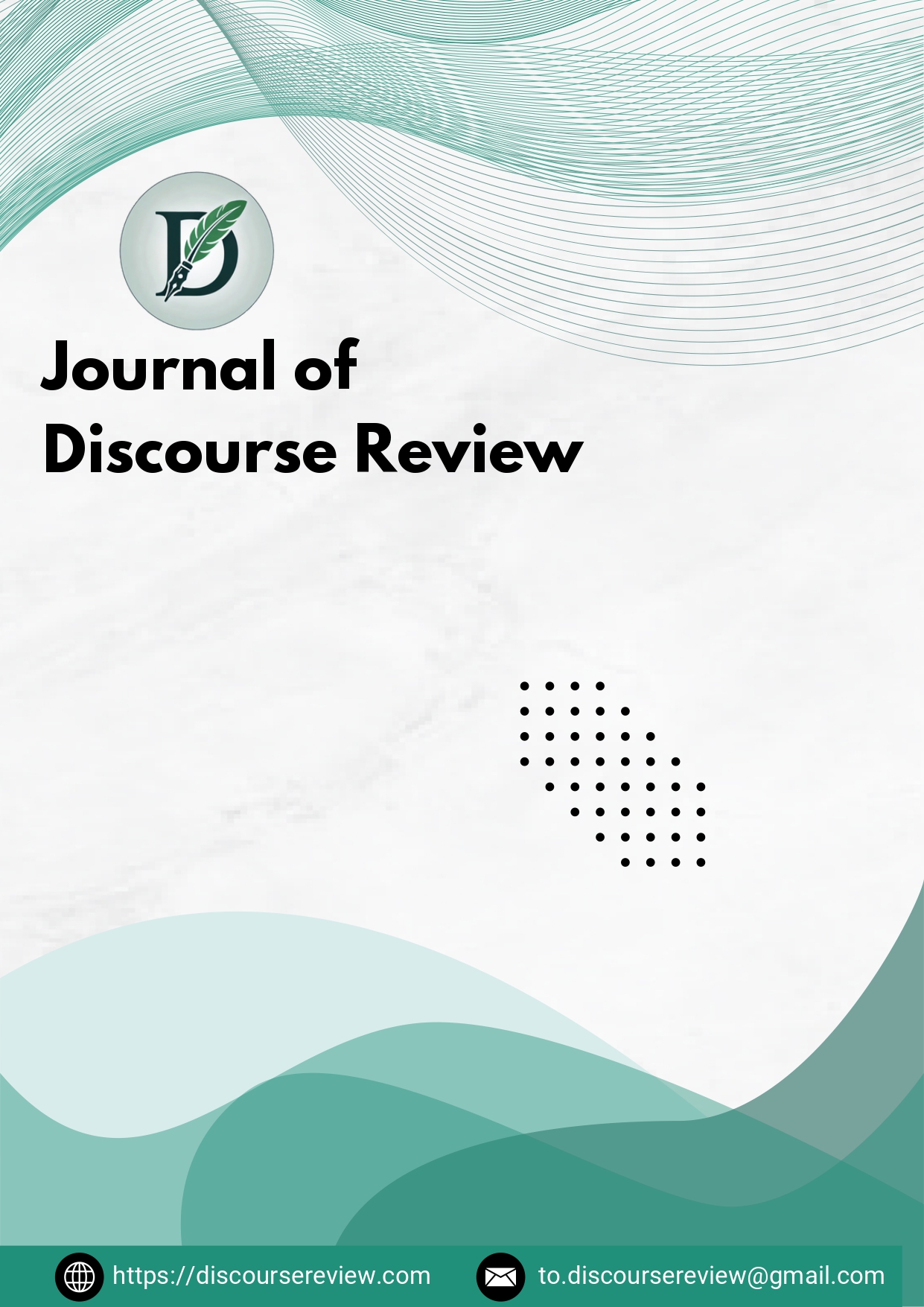
Journal of Discourse Review
Open Access Humanitarian scholarship
7 days
Time to first decision

Open Access Humanitarian scholarship
Time to first decision
Volume: 1 Issue: 2
Year: 2025, Page: 158-168,
Received: June 10, 2025 Accepted: June 24, 2025 Published: July 22, 2025
This paper looks at how the English language plays a complex role in tribal literature, focusing on its ability to empower as well as its potential to erase indigenous identities. By critically analysing literary works from various tribal authors and conducting qualitative interviews with writers and community members, the research shows that while English can help reach broader audiences and social-political platforms, it also risks undermining cultural narratives and traditions. The findings reveal a complex situation in which English acts both as a bridge for expressing identity and as a barrier to cultural preservation, showcasing the challenges faced by Indigenous peoples in a globalised literary setting. This study is important because it highlights the link between language, identity and culture, providing insights for healthcare by understanding how language dynamics influence the well-being of tribal communities. By recognising the role of English in shaping identities and stories, healthcare professionals can better understand the cultural factors that impact health outcomes for these groups. As a result, this research aids in promoting a culturally aware approach to healthcare, calling for greater inclusion of Indigenous voices and viewpoints, thus promoting an environment that respects and values their rich cultural traditions while encouraging their empowerment in the wider society.
Keywords: Tribal Literature, Language and Identity, Cultural Preservation, Empowerment, Indigenous Voices in Globalization.
Adebisi, J. A. (2010). Assessment of the impact of women’s organizations on sustainable rural environment and livelihood in Nigeria. Semantic Scholar.
https://www.semanticscholar.org/paper/afbd4d31a7f42180970935fa5a8d0ebcdcb22ef0
Bird, M. Y., & Clarke, K. (2020). Decolonizing pathways towards integrative healing in social work. Routledge. https://doi.org/10.4324/9781315225234
Chakrabarty, D. (2022). The use of English in tribal literature. [Quoted in narrative].
Charmaz, K. (2016). The power of constructivist grounded theory for critical inquiry. Qualitative Inquiry, 22(1), 34–45. https://doi.org/10.1177/1077800416657105
Chiu, M.-H., & Duit, R. (2011). Globalization: Science education from an international perspective. Journal of Research in Science Teaching, 48(6), 553–566. https://doi.org/10.1002/tea.20427
Collins, P. H. (2015). Intersectionality’s definitional dilemmas. Annual Review of Sociology, 41, 1–20. https://doi.org/10.1146/annurev-soc-073014-112142
Dharavath, M. (2023). Centring the Adivasi Literature: Becoming and Being. Social Inclusion, 11(1), SAGE Publications. https://doi.org/10.1177/2455328X221150562
Dutta, U., Azad, A. K., & Hussain, S. M. (2021). Counterstorytelling as epistemic justice: Decolonial community‐based praxis from the Global South. American Journal of Community Psychology, 67(1–2), 59–70. https://doi.org/10.1002/ajcp.12545
Esch, K. S. V., Motha, S., & Kubota, R. (2020). Race and language teaching. Language Teaching, 53(3), 391–421. https://doi.org/10.1017/S0261444820000269
Flores, N., & Rosa, J. (2015). Undoing appropriateness: Raciolinguistic ideologies and language diversity in education. Harvard Educational Review, 85(2), 149–171. https://doi.org/10.17763/0017-8055.85.2.149
Grosfoguel, R. (2011). Decolonizing post-colonial studies and paradigms of political economy. Transmodernity, 1(1). https://doi.org/10.5070/T411000004
Harris, S. (2012). Language rights and Aboriginal languages in Australia. In Language Testing and Assessment in Indigenous Contexts. Springer
Jangir, P., & Kumar, A. (2023). Echoes of Change: Transformative Narratives in Contemporary Tribal Literature. ShodhKosh: Journal of Visual and Performing Arts, 4(2), 1407–1413.
https://doi.org/10.29121/shodhkosh.v4.i2.2023.2463
Khalifa, M., Gooden, M. A., & Davis, J. E. (2016). Culturally responsive school leadership. Review of Educational Research, 86(4), 1272–1311. https://doi.org/10.3102/0034654316630383
Krishna, D., & Handoko, H. (2024). An Analysis of Vulnerable Languages of Bihar from Ecological Linguistic Perspective. Jurnal Gramatika, 10(1), 170–178. https://doi.org/10.22202/jg.2024.v10i1.8131
McCarty, T. L., Nicholas, S. E., Chew, K. A. B., Diaz, N. G., Leonard, W. Y., & White, L. (2018). Hear our languages, hear our voices: Storywork as theory and praxis in Indigenous-language reclamation. Daedalus, 147(2), 160–172. https://doi.org/10.1162/DAED_a_00499
Meighan, P. J. (2023). “What is language for us?”: Community-based Anishinaabemowin language planning using TEK-nology. Language Policy, 22(2), 223–253. https://doi.org/10.1007/s10993-023-09656-5
Nguyen, A.-M. D., & Benet-Martínez, V. (2012). Biculturalism and adjustment. Journal of Cross-Cultural Psychology, 43(1), 122–159. https://doi.org/10.1177/0022022111435097
Norton, B., & Toohey, K. (2011). Identity, language learning, and social change. Language Teaching, 44(4), 412–446. https://doi.org/10.1017/S0261444811000309
Outlook India. (2022, August 20). Adivaani: The Adivasi Voice, The First Voice. Outlook India. https://www.outlookindia.com/culture-society/adivaani-the-adivasi-voice-the-first-voice-weekender_story-245694?utm_source=chatgpt.com
Rosillo-Rodes, P., San Miguel, M., & Sánchez, D. (2023). Modeling language ideologies for the dynamics of languages in contact. Chaos: An Interdisciplinary Journal of Nonlinear Science, 33(11).
Roy, A. (2023). The dilemma of using English in tribal literature. [Quoted in narrative].
Smith, T., Avraamidou, L., & Adams, J. D. (2022). Culturally relevant/responsive and sustaining pedagogies in science education. Cultural Studies of Science Education, 17, 637–660. https://doi.org/10.1007/s11422-021-10082-4
Tjijombo, U., Fredericks, N. J., & Hautemo, A. M. (2025). A Sociolinguistic Investigation of Language Shift and. English Language, Literature & Culture, 10(1), 1-12.
Vertovec, S. (2022). Superdiversity. Routledge. https://doi.org/10.4324/9780203503577
Vishnu, P., Afroj, S., & Ahmad, M. (2025). Mother Tongue as a Cultural Anchor: Identity, Heritage and Language Preservation. Journal of Discourse Review, 1(1), 109-119.
Whalen, D. H., Lewis, M. E., Gillson, S., McBeath, B., Alexander, B., & Nyhan, K. (2022). Health effects of Indigenous language use and revitalization: A realist review. International Journal for Equity in Health, 21., Article 169. https://doi.org/10.1186/s12939-022-01782-6
Whalen, D. H., Lewis, M. E., Gillson, S., McBeath, B., Alexander, B., & Nyhan, K. (2022). Health effects of Indigenous language use and revitalization: A realist review. International Journal for Equity in Health, 21, Article 169. https://doi.org/10.1186/s12939-022-01782-6
Williams, D. R. (2018). Stress and the mental health of populations of colour. Journal of Health and Social Behavior, 59(4), 466–485. https://doi.org/10.1177/0022146518814251
© 2025 JDR Academic Trust. This is an open-access publication distributed under the terms of the Creative Commons Attribution 4.0 International License (CC BY 4.0). https://creativecommons.org/licenses/by/4.0/
Nimavat, D & Upadhyay, A. (2025). English as Empowerment or Erasure? Navigating Existential Dilemmas in Tribal Literature. Journal of Discourse Review, 1(2), 158-168.